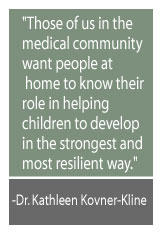
|
For Release: September 10, 2003
Contact: DMS Communications (603) 650-1492
Print Version
Report Calls for Community Involvement in Raising Emotionally Healthy Children
HANOVER, NH - The Commission on Children at Risk, a panel of leading doctors, research scientists and youth service professionals has issued a report detailing new strategies to reduce the high number of US children who suffer from emotional and behavioral problems. The recommendations in the report are based on new scientific evidence that children are "hardwired" for close attachments to other people and lack of these connections can predispose children to depression, anxiety, substance abuse, and thoughts of suicide.
The report, "Hardwired to Connect: The New Scientific Case for Authoritative Communities," represents the first time that neuroscientists have collaborated with social scientists who study civil society to improve outcomes for children. "We found that a child's environment and community can have an incredible effect on the development of their long-term mental and emotional health, " said child psychiatrist Dr. Kathleen Kovner Kline of Dartmouth Medical School, the lead author.

The commission points to large and growing numbers of American children suffering from mental health problems the commission recommends that "authoritative communities" take on the responsibility to address young people's moral and spiritual needs. Authoritative communities, as defined in the report, are groups of people who are committed to one another over time and who exhibit and are able to pass on what it means to be a good person.
"Hardwired to Connect" cites the urgent need for more community involvement in the upbringing of children. Among other troubling statistics, scholars at the National Research Council in 2002 estimated that at least one of every four adolescents in the US is at serious risk of not achieving productive adulthood. Twenty-one percent of US children ages 9 to 17 have a diagnosable mental disorder or addiction; 8 percent of high school students suffer from clinical depression; and 20 percent of students report seriously having considered suicide in the past year.
"We will continue to develop new treatments for addressing kids' mental an emotional health, but we also want to bring attention to the preventative responsibilities of our communities," said Dr. Kovner-Kline. "Those of us in the medical community want people at home to know their role in helping children to develop in the strongest and most resilient way."
The commission based its recommendations on its review of scientific findings published by neuroscientists and behavioral scientists that address the biological basis of primary nurturing relationships and their effect on the brain and human behavior. These findings suggest that strong nurturing and a stable environment can reduce behaviors that are associated with aggression, anxiety, depression or substance abuse.
Members of the Commission on Children at Risk include leaders and faculty from various institutes and universities including Harvard Medical School, Yale University, UCLA School of Medicine, Dartmouth Medical School, and The American Academy of Child and Adolescent Psychiatry. The co-investigator of the report, Dr. Arthur Maerlender, Jr., is an instructor in Psychiatry at Dartmouth Medical School.
The study was co-sponsored by the Institute for American Values and the YMCA of the USA. More information on the study can be found at www.americanvalues.org.